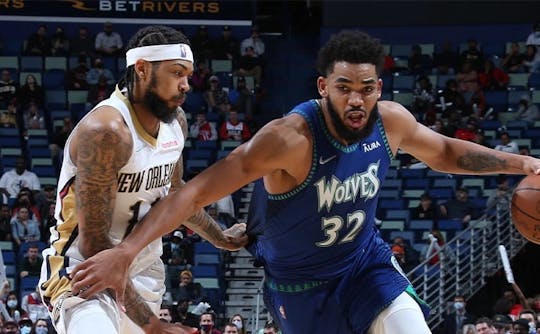On paper, the first round of the playoffs went off without a hitch. The top-seeded teams moved on as planned. The stars handled their respective businesses.
Look closer and two of those top-seeded teams in the Western Conference have tiny scars and bruises they’d want to cover up. The eighth-seeded New Orleans Pelicans and the seventh-seeded Minnesota Timberwolves did that.
Both teams extended their respective series to six games, perhaps a game or two longer than expected. And that’s not a knock on the Pelicans and the Wolves. It’s just that they drew two of the regular season’s best teams in the league in the Phoenix Suns and the Memphis Grizzlies.
The Pelicans and the Wolves looked at the odds and flat-out laughed at them. This could’ve been their only response, judging how these two teams came so close to completing the proverbial upset.
Between the two though, the Pelicans had it tougher. It had been a season-long “will he or won’t he” tug-of-war on the Zion Williamson situation. Williamson was so good last season that hope had become a curse. Finally, the Pelicans had to make a move midseason to move pieces, to breathe life into the franchise, to make this Pelicans season less Zion-centric. It worked.
With CJ McCollum coming in, the Pelicans behaved like a totally different animal. Wins started to trickle in, and before you know it, they got their foot in the door of the play-in tournament. The new-look Pelicans paved the way for Brandon Ingram to play his best basketball. It gave burn to Jose Alvarado. It allowed Herb Jones to blossom.
That’s why against a veteran Suns team, the Pelicans looked neither scared nor shy. They wanted it as bad as an Alvarado backcourt heist.
The Wolves, although equally energetic as the young Pelicans, had a different path to the playoffs. While the Pelicans recalibrated their roster, the Wolves just realigned the wheels. Keeping the core of Karl-Anthony Towns, Anthony Edwards, and D’Angelo Russell, the Wolves believed they could do it. New head coach Chris Finch built a new system, and off they went. It worked.
After ousting playoff staple Los Angeles Clippers, Minnesota landed at the seventh spot to face the young and inexperienced Grizzlies. At many points during the series, the Grizzlies were exactly that, and the Wolves pounced. They took home court advantage and took huge leads in the second half, only to watch the Grizzlies—time and time again—take it back from them.
The Wolves’ flaws were exposed, as is usually the case with teams whose core is in their early 20s. The Grizzlies were young too, but the sheer talent of a supernova like Ja Morant supersedes age. Edwards, who’s only turning 21 this year, will get there.
The Pelicans, once Zion joins this retooled team, will get there. They’ve shown it in brief spurts and fleeting moments when you’d question your very basic basketball beliefs. What if the Suns falter? What if Memphis was a fluke?
For a minute there, these questions didn’t seem absurd, all because a group of young, brash, skilled, and electrifying individuals gave us a glimpse of what the future of basketball looks like. Too bad they just can’t close.
But the good thing is that closing games comes with growing up. Growing up, if the mindset is in the right place, comes after losing.




